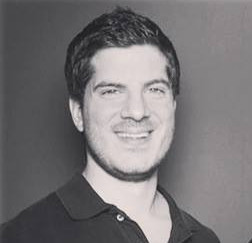I used to be a huge fan of self-improvement materials. Growing up in a family invested in Amway, I was surrounded by self-help books and motivational texts from the time I was born. Amway encouraged sales associates to consume these materials in order to keep motivation high, push through defeat, and close the sales they needed. A normal car ride during my childhood would involve us listening to tapes of Les Brown speaking over “Eye of the Tiger” while I’d sit in the back reading The Magic of Thinking Big by David Schwartz. By the time I was 12, I had already read Norman Vincent Peale, Napoleon Hill, and countless others.
So how was it that everything still fell apart?
By the time I was 25, I was ready to end my life. My drive to succeed had created an intense self-critic inside me, a voice that constantly pushed me to jump higher and run faster. The further behind I felt, the harsher it became. Fear was an excellent short-term motivator, but it came at a long-term cost. Pushing myself via self-disdain was like making withdraws from a back account without ever putting money back in. After years of working in full-time emergency response with 24/7 call out, going to graduate school full-time at night (because that’s what winners do), and completely neglecting my health, I was spent. The internal criticism and pressure remained, but I had nothing left to give. Losing my life seemed like the only way to find relief.
I was fortunate enough to realize my situation, find help, and start my healing process. Over 10 years later, I can see many reasons why this situation occurred. Yet I can’t help but be curious about the impact self-improvement materials played in my life. On the one hand, I was surrounded by the message I could be whoever I wanted to be—all I had to do was believe and work towards it. On the other, this programming created significant pressure to succeed. I couldn’t just be anyone; I had to be amazing. My potential had to be realized! If I failed to “actualize” myself, I’d be the exact type of person these motivational tapes used as cautionary tales. Success didn’t just mean money. It meant being someone deserving of love and respect.
Are these materials the best choice?
I’m now a professional coach who specializes in working with individuals who struggle with high self-criticism and self-pressure just as I did. While I don’t work with actively suicidal individuals (I have a network of counselors I refer them to instead), I am highly effective in helping people break out of self-inflicted pain. It doesn’t matter if it is a college student terrified of falling behind or someone in their 40s who is tired of feeling insecure: Once individuals build a healthy relationship with themselves, everything else starts to fall into place.
While there are plenty of books and materials I recommend, virtually zero traditional self-improvement texts have made it onto this list. They’re just not that effective. Those who know me know I don’t focus on ideology or philosophy. Before becoming a coach, I worked in local counter-terrorism and emergency response. There’s no time for theory. The only thing that matters is finding what works. Don’t debate the problem–solve it. When I brought this energy towards coaching, most self-improvement material didn’t make the cut. As it turned out, most clients were fine with this. The vast majority had already binged on self-improvement materials themselves—usually with minimal long-term results.
While there are materials I now recommend (which will soon include my own book!), virtually none of them are found on the usual self-help shelf or advertised by online “confidence gurus.” The path that seems to work best for overcoming insecurity–building a healthy self-relationship with ourselves–requires a different approach.
The Problem With Self-Improvement
While we could talk about multiple issues, one problem towers over all: Many self improvement materials tell us who we should be instead of helping us discover who we already are so we can create a better life for this person.
Anyone who comes from a background of insecurity knows what it’s like to chase an ideal. We create the perfect image of who we think we should be and try to beat ourselves into that mold. While there may be short-term gains, this strategy often fails over the long-term. It’s not sustainable. Changing who we are requires enormous energy. Once life throws us a surprise that demands our energy and attention—something that’s guaranteed to happen—we often fall back into old habits and behavior. This doesn’t just equate to wasted time and effort. It can also give us even more reason to engage in self-criticism, find ourselves lacking, and reinforce the belief we’re “not enough.”
The idea that we can be whoever we want to be is seductive but potentially harmful. We all have unique emotional needs; ignoring who we are and focusing on who we should be often causes us to neglect this truth. Yet we can’t run away from ourselves. This is how I describe it to clients: “John can make healthy decisions or John can make unhealthy ones, and both Johns will live entirely different lives—but John can’t stop being John.” We aren’t gods. There are limits to our power. Accepting this truth allows us to take a healthier journey towards personal growth.
From Self-Conflict to Self-Collaboration
I believe we are called to discover and honor ourselves. Recently, I was looking at a small cactus my godmother purchased from the store. She loves plants and has them all over her house. As I spun the pot around, I saw a tag with a note on it. It read, “Here’s what I need to thrive!” and listed all the sun, water, and temperature requirements. This is exactly what it’s about. The best way to serve this cactus is to become curious about its needs and find out how to fill them best. If we were to take it and plant it in the jungle, it would instantly die. But if we accepted its truth and planted it in the desert, it could thrive for hundreds of years.
We are the same way. That’s why I don’t work in the business of self-improvement. Instead, I help people improve at honoring themselves.
Self-collaboration always beats self-conflict. Years ago, I sat at lunch with a friend who I met while doing martial arts. When I asked how he got into it, he told me a story about how he used to believe he lacked self-discipline and hated exercise. He lifted weights for a few months before getting bored, ran for a while before losing motivation, and dabbled in other activities without success. He viewed himself as an undisciplined slob who couldn’t be trusted with anything. Then he heard about Brazilian Jiu-Jitsu and discovered a ball of excitement inside him. He tried it out and was hooked. Within weeks, his “discipline problems” melted away: he was going to the gym 3x a week, started running to increase his stamina, and trained techniques at home. He never had a discipline problem—his “laziness” was his soul letting him know these activities didn’t match with who he was. Once he worked in harmony with himself instead of engaging in self-conflict, all the character traits he looked for came rushing in.
I help clients build an internal relationship that allows them to find self-harmony, honor who they are, and pursue the things that matter to them most. Improving their self-relationship doesn’t just allow them to live a more pleasant life, it also usually results in their external relationships becoming more intimate as well. Honoring our truth allows us to be seen and loved for who we really are.
Think about your own life: What changes might occur if you could improve your self-relationship? Contact me to schedule your free consultation and find out!




